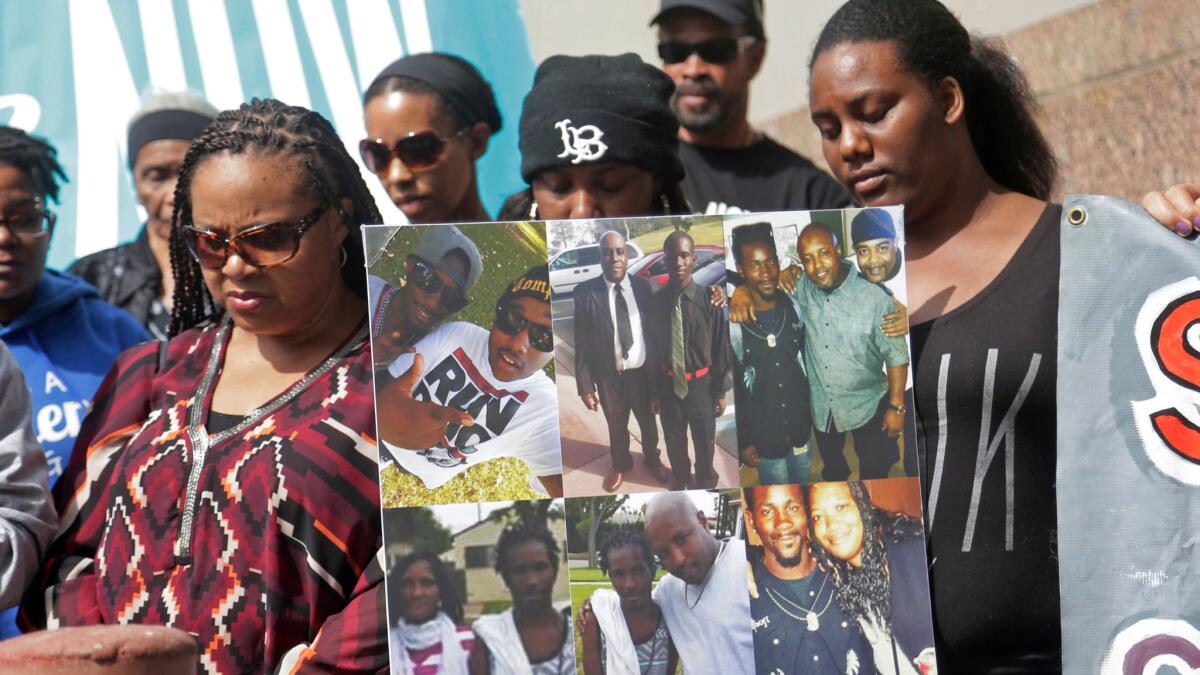Opinion: Anguish, anger over police shootings

- Share via
To the editor: The Times editorial reflects a narrative that has developed in the last several years, where any time peace officers use force they are presumed to be in the wrong.
( “An oversight commission now,” Editorial, Aug. 12, “Family wants evidence from LAPD,” Aug. 14, and “City is tense after police killing,” Aug. 15)
The Times’ belief that “civilian oversight commissions” are the great answer for police oversight is greatly misplaced. These commissions are filled with political appointees who have little prior knowledge of the police work, even though they are empowered to second-guess the actions of law enforcement.
In contrast, Sheriff Department detectives who investigate the use of force by deputies are intimately familiar with the departments’ rules and training.
The district attorney’s office, which investigates all deadly uses of force, is intimately familiar with the law and, of course, there is an elected sheriff who makes the ultimate determination as to whether a use of force was in violation of policy.
George Hofstetter, Monterey Park
The writer is the president of the Assn. for L.A. Deputy Sheriffs.
::
To the editor: The shooting of Jesse Romero in Boyle Heights is a reminder that to me the LAPD’s mentality of shooting first, pander later, has stayed the same for the last 30 years.
Some officers don’t see gang members as human beings, but as undesirable creatures to be eliminated.
After Romero’s death, there was talk about the need to create community outreach. But my past experiences show that they’re not there to create real solutions. After attending one meeting to discuss gang problems, I was given contact numbers that were only prerecorded messages. Nothing has changed in 30 years.
Andres Bautista, Los Angeles
::
To the editor: The recent incident in Milwaukee is tragic.
As an attorney, I understand the desire to marshal facts before presenting an argument, but there are many situations in which that is simply not possible, and audio and video recordings of public officials, in public, are obviously data whose release should not be delayed, especially with the discretion of government — whether you look at the possibility of averting riots such as those in Milwaukee or the lack of transparency (and trust) in policing nationally, which has caused so much unrest.
Sooner rather than later, we will have transparency on police conduct.
Joseph Bartlett, Santa Monica
::
To the editor: I am frustrated by the constant downgrading and disregard of the police. My father retired as s police officer after 30 years’ service. The job was and is dangerous and requires skill, dedication and bravery.
I proclaim that anyone who runs away from an identified police officer or who resists legal commands then loses all rights. What happens, happens.
Do not blame the police officer for enforcing the law or protecting himself.
George W. Zeissner, Fountain Valley
::
To the editor: I’m getting tired of seeing the media focus on police brutality and failing schools (stories like “why Johnny can’t read”).
I see nothing about the role of parents, the primary role models, in these sad situations.
Isn’t it time to ask why parents aren’t teaching their children to stay out of trouble and do their homework?
Dave Pierce, Los Angeles
Follow the Opinion section on Twitter @latimesopinion and Facebook
A cure for the common opinion
Get thought-provoking perspectives with our weekly newsletter.
You may occasionally receive promotional content from the Los Angeles Times.






